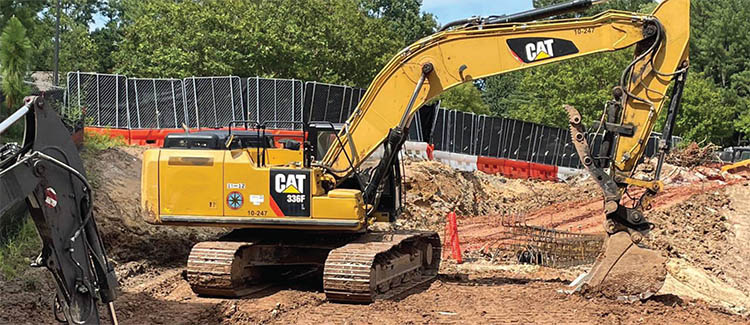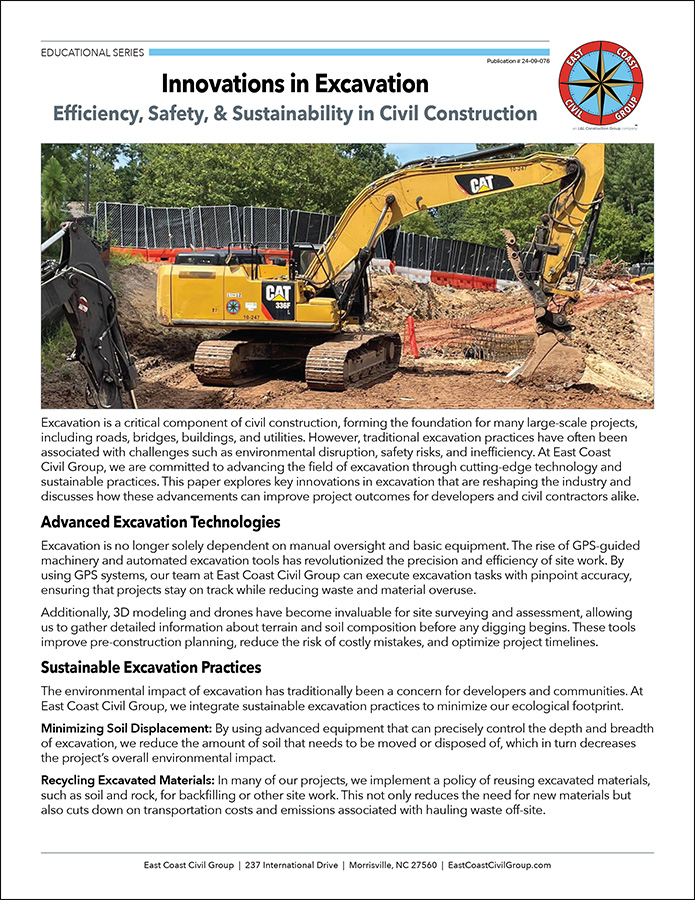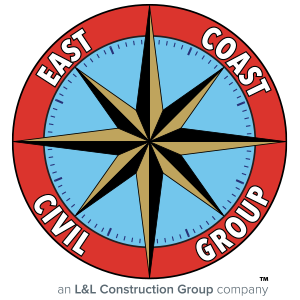
Excavation is a critical component of civil construction, forming the foundation for many large-scale projects, including roads, bridges, buildings, and utilities. However, traditional excavation practices have often been associated with challenges such as environmental disruption, safety risks, and inefficiency. At East Coast Civil Group, we are committed to advancing the field of excavation through cutting-edge technology and sustainable practices. This paper explores key innovations in excavation that are reshaping the industry and discusses how these advancements can improve project outcomes for developers and civil contractors alike.
Advanced Excavation Technologies
Excavation is no longer solely dependent on manual oversight and basic equipment. The rise of GPS-guided machinery and automated excavation tools has revolutionized the precision and efficiency of site work. By using GPS systems, our team at East Coast Civil Group can execute excavation tasks with pinpoint accuracy, ensuring that projects stay on track while reducing waste and material overuse.
Additionally, 3D modeling and drones have become invaluable for site surveying and assessment, allowing us to gather detailed information about terrain and soil composition before any digging begins. These tools improve pre-construction planning, reduce the risk of costly mistakes, and optimize project timelines.

Sustainable Excavation Practices
The environmental impact of excavation has traditionally been a concern for developers and communities. At East Coast Civil Group, we integrate sustainable excavation practices to minimize our ecological footprint.
Minimizing Soil Displacement: By using advanced equipment that can precisely control the depth and breadth of excavation, we reduce the amount of soil that needs to be moved or disposed of, which in turn decreases the project’s overall environmental impact.
Recycling Excavated Materials: In many of our projects, we implement a policy of reusing excavated materials, such as soil and rock, for backfilling or other site work. This not only reduces the need for new materials but also cuts down on transportation costs and emissions associated with hauling waste off-site.
Erosion Control: Our team employs cutting-edge techniques, such as installing silt fences and temporary drainage systems, to prevent soil erosion during the excavation process. This is crucial for protecting local water sources and maintaining the structural integrity of the site.
Safety Innovations
Excavation work inherently involves risks, including trench collapses, equipment-related accidents, and the discovery of underground hazards. However, advancements in safety innovations have significantly reduced these dangers, making excavation safer for workers and project sites alike. Some of the key safety innovations in the industry include:
Real-Time Monitoring Systems: Modern excavation sites now utilize sensors and monitoring systems to track changes in soil stability and moisture levels. These systems provide immediate feedback, allowing teams to respond quickly to shifting ground conditions that could lead to cave-ins or other hazards.
Trench Shoring and Shielding: In deep trench excavations, trench collapse is a major concern. Shoring technologies, such as hydraulic shoring and trench boxes, are designed to reinforce trench walls, preventing collapses and ensuring that workers can safely operate in these environments. These systems are often modular and adaptable, allowing them to be used across a variety of trench sizes and depths.
Equipment Automation and Remote Control: The use of automated and remotely controlled machinery has greatly improved worker safety on excavation sites. Operators can now control heavy equipment from a distance, reducing their exposure to dangerous situations and minimizing the risk of human error in critical tasks like digging near underground utilities.
Safety Protocols and Training: At East Coast Civil Group, we have instituted rigorous safety protocols and provide continuous training for our crew to stay compliant with the latest industry standards, ensuring a safe working environment for every project.
These innovations, along with stricter regulations and safety standards, have helped make excavation work significantly safer, ensuring that projects can be completed with minimal risk to workers and the surrounding environment. By adopting and continually updating these practices, the excavation industry is reducing accidents, improving efficiency, and fostering a culture of safety.
— Conclusion —
At East Coast Civil Group, we believe that innovation is key to advancing excavation in civil construction. By adopting the latest technology, improving safety measures, and integrating sustainable practices, we provide clients with efficient, cost-effective, and environmentally responsible solutions. As we continue to embrace these innovations, we are committed to delivering exceptional results on every project, whether small, medium, or large-scale.
